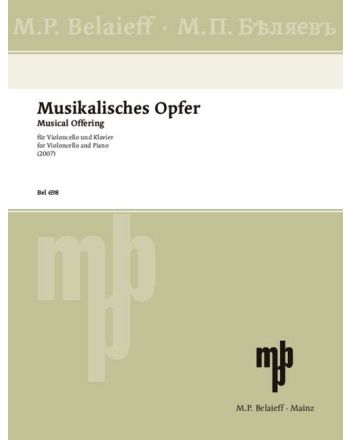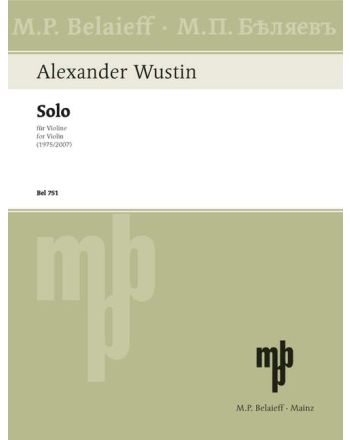
Alexander Wustin
About Alexander Wustin
Alexander Wustin was born in Moscow on 24 April 1943. He began to study composition in 1960, initially with G. Frid at a music school for gifted children, and subsequently with V. Ferè at the Tchaikovsky Conservatory in Moscow.
Since the middle of the 1980s his works have been included in the programmes of leading Western music festivals such as Donaueschinger Musiktage, Holland Festival, Musik Biennale in Berlin, Tage für Neue Musik in Zurich, and Kammermusikfest Lockenhaus in Austria. Performers of his music include Gidon Kremer, Reinbert de Leeuw, Eri Klas, Mark Pekarsky and Friedrich Lips, and ensembles such as BBC Symphony Orchestra, Schönberg Ensemble, and Nieuw Sinfonietta Amsterdam.
There can be no doubt about the fact that Alexander Wustin was one of the most self-willed members of his generation in Russia. "In every one of his works we are struck by the presence of unique and indeed inimitable traits. Wustin does not belong to any particular school, and is certainly not interested in chasing after the latest fads. He remains true to himself, and in our day and age that is rather remarkable." (Edison Denisov)
The composer has described his musical creed thus: “In each of my works I am trying, primarily for my own benefit, to resolve the problem of time (as I understand it). It seems to me that it is the composer’s task, whatever he happens to be doing, to try to discern the presence of a universally valid law and to submit to its dictates in the midst of the compositional process. The true worth of a composition depends on the extent to which the composer actually manages to do this. All other aspects, such as style, material, dynamics, tone colour and “emotional” character, are of secondary importance. The law which governs musical time may be expressed in numerical terms.”
Wustin’s output is many-sided and imaginative. His most important compositions include an opera, The Devil in Love (after J. Cazotte, 1989); orchestral works, Symphony (1969), Memoria 2 (1978), Homage à Beethoven (1984), Sine Nomine (2000), and Exposure of Eva (2004); vocal compositions with orchestra orinstrumental ensemble, Homecoming (1981), Kosma Prutkov’s Leisure Hours (1982), The Feast (1987), and Blessed are the poor in spirit (1988); and pieces forsolo instruments and chamber ensembles (in whichpercussion often plays a prominent role), Sonata for 6 (1973), Nocturnes (1982), The Word (1975), Music for Ten (1991), Postlude (2003), Evening Birds (2006) and Musical Offering (2007).
Products
-
Composer BrochurePromotional materialPromotional materialIn stock€0.00Incl. Tax, Excl. Shipping
-
for pianoComposer: Alexander WustinMedia Type: E-score PDFEdition: Separate editionInstrumentation: pianoProduct number: BEL 850 Q10906E-score PDFE-score PDFIn stock€2.99Incl. Tax
-
für OrgelComposer: Vladislav Shoot | Alexander WustinMedia Type: Sheet musicSeries: exempla nova, 137
Instrumentation: organProduct number: SIK1837Print editionPrint editionIn stock€25.50Incl. Tax, Excl. Shipping -
A collection of new pieces for pianoMedia Type: Sheet musicInstrumentation: pianoLanguage: EnglishProduct number: ED 21470Print editionPrint editionIn stock€10.00Incl. Tax, Excl. Shipping
-
for tubular bells solo and orchestraHire/performance materialHire/performance material
-
für OrgelComposer: Viktor Suslin | Alexander WustinMedia Type: Sheet musicSeries: exempla nova, 136
Instrumentation: organProduct number: SIK1836Print editionPrint editionIn stock€20.50Incl. Tax, Excl. Shipping -
Composer: Alexander WustinMedia Type: Sheet musicEdition: Score and partsInstrumentation: soprano and string quartetLanguage: LatinProduct number: BEL 563Print editionPrint editionIn stock€28.00Incl. Tax, Excl. Shipping
-
auf einen Text von Jean-François de la HarpeComposer: Alexander WustinMedia Type: Hire/performance materialEdition: Performance materialInstrumentation: ensembleLanguage: RussianHire/performance materialHire/performance material
-
for cello and pianoComposer: Alexander WustinProduct number: BEL 698Product TypeIn stockAs low as €22.99Incl. Tax
-
in memoriam Dmitri ShostakovichComposer: Alexander WustinMedia Type: Sheet musicEdition: Score and partsInstrumentation: violin, viola, cello, piano, Campanelli, percussion (2 player)Product number: BEL 697Print editionPrint editionOut of stock€38.00Incl. Tax, Excl. Shipping
-
Composer: Alexander WustinMedia Type: Sheet musicEdition: Performing score, and set of partsProduct number: BEL 631Print editionPrint editionIn stock€25.50Incl. Tax, Excl. Shipping
-
für OrchesterHire/performance materialHire/performance material
-
Product TypeIn stockAs low as €6.99Incl. Tax
-
from the novel "Chevengur" by Andrey PlatonovComposer: Alexander WustinAuthor: Andreij PlatonovMedia Type: Hire/performance materialEdition: Performance materialLanguage: RussianHire/performance materialHire/performance material
-
from the novel "Chevengur" by Andrey PlatonovComposer: Alexander WustinMedia Type: Sheet musicEdition: ScoreSeries: Lied
Instrumentation: male choir and orchestraLanguage: German, Russian, EnglishProduct number: BEL 616Print editionPrint editionIn stock€12.50Incl. Tax, Excl. Shipping -
Composer: Alexander Knaifel | Tigran Mansurian | Alfred Schnittke | Pēteris Vasks | Alexander WustinMedia Type: Sheet musicSeries: exempla nova, 189
Instrumentation: celloProduct number: SIK1889Print editionPrint editionIn stock€27.50Incl. Tax, Excl. Shipping -
"Hommage à Guidon"Hire/performance materialHire/performance material
-
"Hommage à Guidon"Composer: Alexander WustinMedia Type: Sheet musicEdition: Score, and solo partSeries: Tango
Instrumentation: violin solo, strings and percussionProduct number: BEL 635Print editionPrint editionIn stock€12.50Incl. Tax, Excl. Shipping -
für gemischten Chor und EnsembleComposer: Alexander WustinMedia Type: Hire/performance materialEdition: Performance materialLanguage: LatinHire/performance materialHire/performance material
-
Composer: Alexander WustinMedia Type: Sheet musicEdition: ScoreSeries: Veni Sancte Spiritus
Instrumentation: mixed chorus and ensembleLanguage: LatinProduct number: BEL 615Print editionPrint editionIn stock€13.50Incl. Tax, Excl. Shipping










